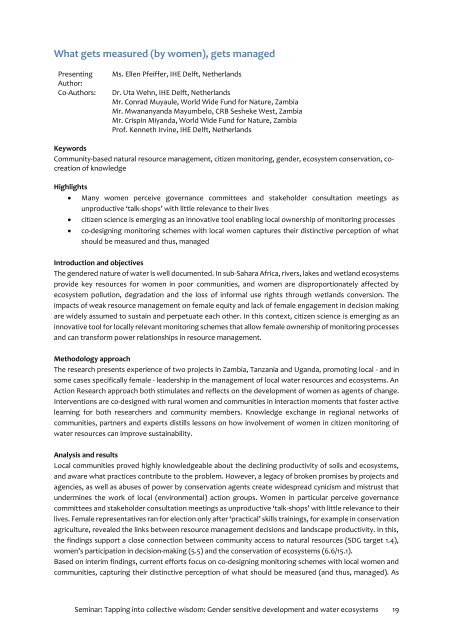2018 Abstract Volume
A compilation of the oral and written scientific presentations chosen to be part of World Water Week 2018 Seminars.
A compilation of the oral and written scientific presentations chosen to be part of World Water Week 2018 Seminars.
Create successful ePaper yourself
Turn your PDF publications into a flip-book with our unique Google optimized e-Paper software.
What gets measured (by women), gets managed<br />
Presenting<br />
Author:<br />
Co-Authors:<br />
Ms. Ellen Pfeiffer, IHE Delft, Netherlands<br />
Dr. Uta Wehn, IHE Delft, Netherlands<br />
Mr. Conrad Muyaule, World Wide Fund for Nature, Zambia<br />
Mr. Mwananyanda Mayumbelo, CRB Sesheke West, Zambia<br />
Mr. Crispin Miyanda, World Wide Fund for Nature, Zambia<br />
Prof. Kenneth Irvine, IHE Delft, Netherlands<br />
Keywords<br />
Community-based natural resource management, citizen monitoring, gender, ecosystem conservation, cocreation<br />
of knowledge<br />
Highlights<br />
• Many women perceive governance committees and stakeholder consultation meetings as<br />
unproductive ‘talk-shops’ with little relevance to their lives<br />
• citizen science is emerging as an innovative tool enabling local ownership of monitoring processes<br />
• co-designing monitoring schemes with local women captures their distinctive perception of what<br />
should be measured and thus, managed<br />
Introduction and objectives<br />
The gendered nature of water is well documented. In sub-Sahara Africa, rivers, lakes and wetland ecosystems<br />
provide key resources for women in poor communities, and women are disproportionately affected by<br />
ecosystem pollution, degradation and the loss of informal use rights through wetlands conversion. The<br />
impacts of weak resource management on female equity and lack of female engagement in decision making<br />
are widely assumed to sustain and perpetuate each other. In this context, citizen science is emerging as an<br />
innovative tool for locally relevant monitoring schemes that allow female ownership of monitoring processes<br />
and can transform power relationships in resource management.<br />
Methodology approach<br />
The research presents experience of two projects in Zambia, Tanzania and Uganda, promoting local - and in<br />
some cases specifically female - leadership in the management of local water resources and ecosystems. An<br />
Action Research approach both stimulates and reflects on the development of women as agents of change.<br />
Interventions are co-designed with rural women and communities in interaction moments that foster active<br />
learning for both researchers and community members. Knowledge exchange in regional networks of<br />
communities, partners and experts distills lessons on how involvement of women in citizen monitoring of<br />
water resources can improve sustainability.<br />
Analysis and results<br />
Local communities proved highly knowledgeable about the declining productivity of soils and ecosystems,<br />
and aware what practices contribute to the problem. However, a legacy of broken promises by projects and<br />
agencies, as well as abuses of power by conservation agents create widespread cynicism and mistrust that<br />
undermines the work of local (environmental) action groups. Women in particular perceive governance<br />
committees and stakeholder consultation meetings as unproductive ‘talk-shops’ with little relevance to their<br />
lives. Female representatives ran for election only after ‘practical’ skills trainings, for example in conservation<br />
agriculture, revealed the links between resource management decisions and landscape productivity. In this,<br />
the findings support a close connection between community access to natural resources (SDG target 1.4),<br />
women’s participation in decision-making (5.5) and the conservation of ecosystems (6.6/15.1).<br />
Based on interim findings, current efforts focus on co-designing monitoring schemes with local women and<br />
communities, capturing their distinctive perception of what should be measured (and thus, managed). As<br />
Seminar: Tapping into collective wisdom: Gender sensitive development and water ecosystems 19


















